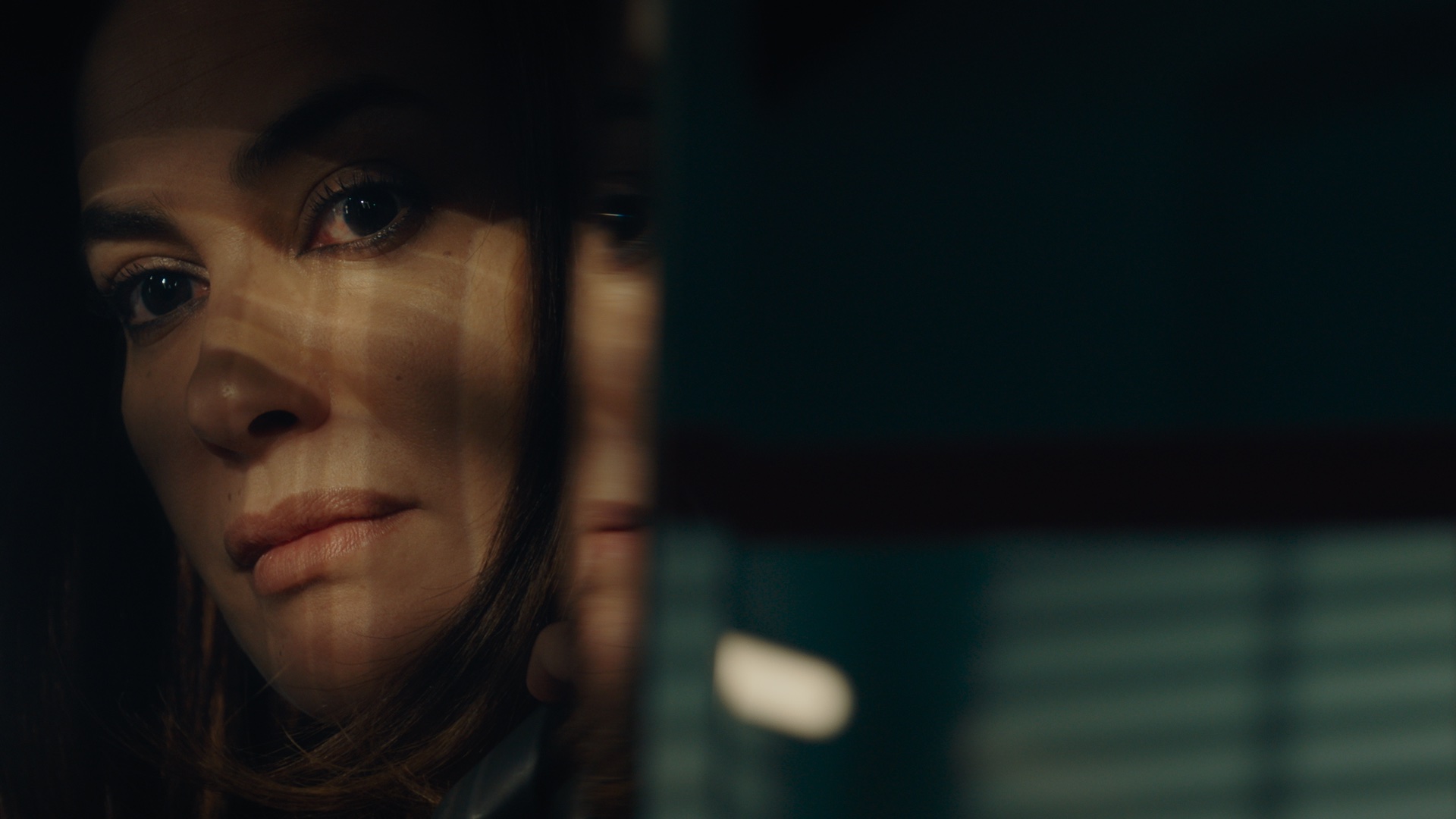A new Tunisian documentary draws on reality and reenactment to examine a family – and a nation – reeling
In the opening scene of Four Daughters, director Kaouther Ben Hania’s voiceover introduces us to Olfa Hamrouni, surrounded by her daughters, Eya and Tayssir, in a typical Tunisian home. Yet something is not quite right. The women’s nervous body language is beyond just camera shyness. Rahma and Ghofrane, Olfa’s two eldest, have defected to the Islamic State, and the film retraces the family’s story and events leading to their disappearance around a decade ago. This is achieved through interviews with the protagonists and the re-enactment of pivotal scenes, played by professional actors stepping in for Rahma (Nour Karoui) and Ghofrane (Ichrak Matar). Actress Hend Sabry plays Olfa when scenes are too vivid for the mother to re-experience.
Ben Hania’s is certainly an ambitious project, taking aim at religious fanaticism, indoctrination and the cycle of intergenerational social violence in Tunisia, while questioning the possibility of redemption. A veil is metaphorically lifted at the start of the film: the camera slowly pans on Olfa, rubbing her hands, Eya, and Tayssir, the three of them sitting on chairs with their bodies directed towards an unseen interlocutor, whom we guess is the filmmaker. We are intruding, the reoccurring keyhole camera view suggests. Then the clapperboard appears and reminds us, with a mix of relief and dread, that this is just a film. Rahma and Ghofrane’s absence casts a long shadow, which is aesthetically emulated in chiaroscuro lighting. The film also replicates conflict in the clash between red and black – symbols of both Tunisia’s flag and the so-called Caliphate – in antagonistic pairings of Eya and Tayssir’s crimson lipstick and their dark garments on a red sofa, which represent opposing elements revealed as the film progresses to discuss sorority, womanhood, menstruation, and ISIS’s distressing sublimation of death.
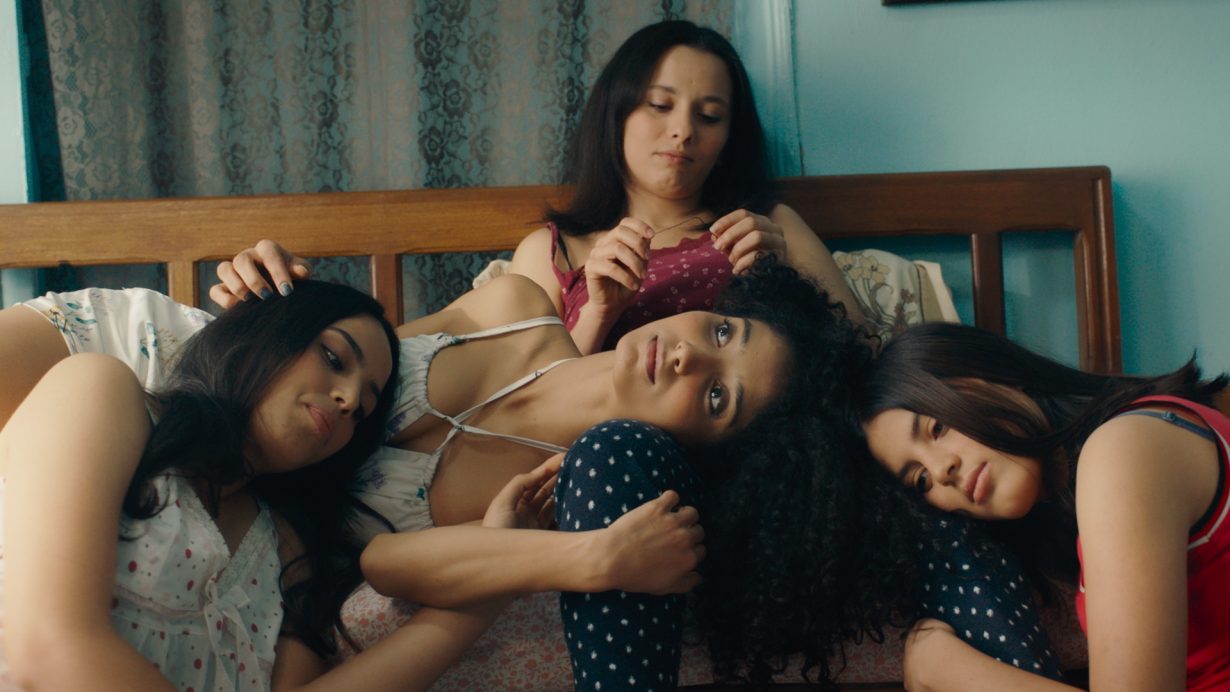
Perhaps most significantly, the film confronts a controversial chapter of recent years. Tunisians once formed one of the largest contingents of foreign recruits to the Islamic State and, among them, hundreds of “ISIS brides”. Affected families and society at large still feel these vivid wounds, so Ben Hania reverses the clock to explore the various factors that propelled Olfa’s two eldest daughters to join the terrorist organisation. This testimony on intimate choices and human fallibility is undoubtedly powerful. Their journey to extremism is in part ascribed to transgenerational violence against women, recalled in one instance in the unbearable reenactment of Olfa’s beating of Ghofrane during her teenage goth phase. Between their often casual tones and the troubling experiences they recall, Ben Hania presents a broken family unit, with absent, substance-addicted and at times predatory male figures, and the girls’ desire for rebellion and emancipation from an overbearing controlling mother.
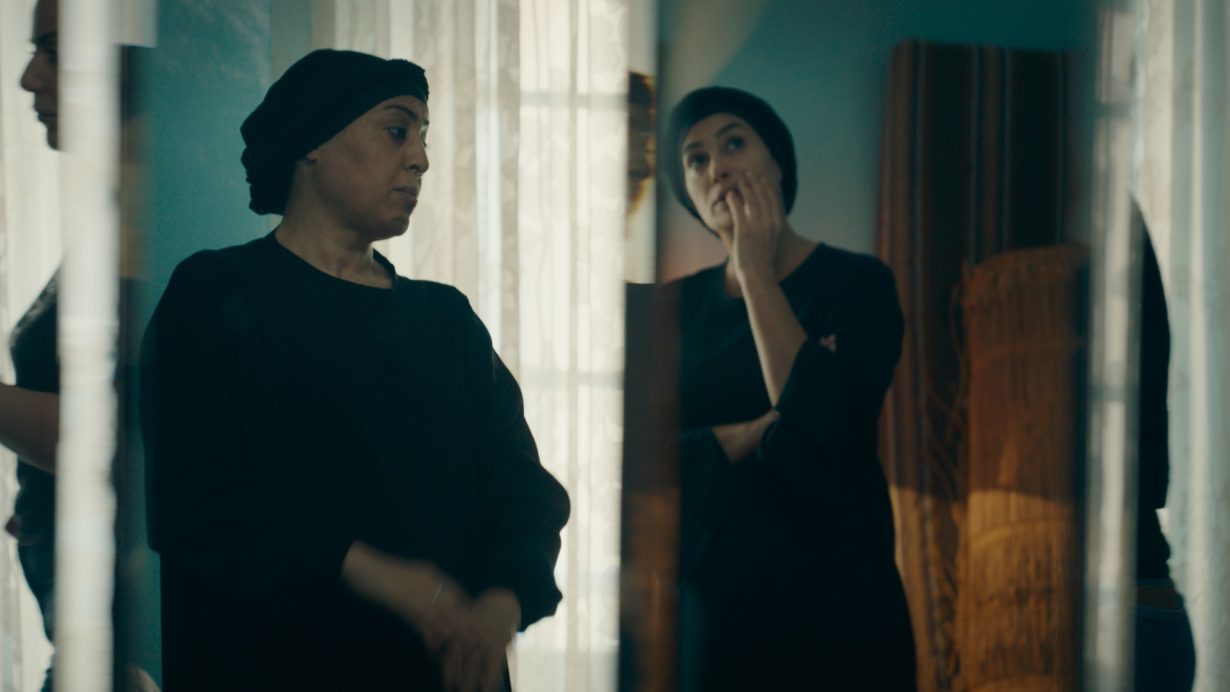
In off-the-cuff remarks during her interviews and the instructions she provides to Hend Sabry, Olfa is often delusional – perpetuating physical punishment to enforce patriarchal norms at the same time as affirming her parental authority as a single mother – and reactionary as she clings on to the idea of female purity and pre-revolutionary, Ben Ali-era nostalgia. She explains that she loves her daughters too much, in thesame vein that abusers regularly excuse their hurtful behaviours. “It’s a curse”, she describes as she realises that she inflicted upon them what she herself went through. Through the complexity of her character’s actions, the film interrogates whether there can be love without destruction and whether an Arab and Muslim woman can live freely without being labelled as a ‘whore’. We see the daughters caught between the pull between secular/Western and Islamist leanings – the latter led the girls to their own demise, the film seems to suggest, while the former is often presented as more desirable, but for whom is unclear. From one traumatic experience to another, the film largely espouses an ordeal-centred narrative which presents Arab and Muslim women as helpless victims that must be saved from themselves and their intrinsically violent families. While we’re supposed to feel uncomfortable with the girls’ story, it also depicts a landscape in which women can’t exist on their own terms, even less so when from a low-income background; their lives must be determined by their interactions with the patriarchy, their reified bodies and clothing. In doing so, it enshrines a prevalent othering of Arabs and Muslims as freaks and monsters, whose function is merely didactic: to warn others not to become like them.
Four Daughters collected several awards, winning best-documentary at Cannes and the French César among other recognitions, and is now in the race for the Oscars. After all, the film seems to reproduce Western obsessions with Arab women and Islam, but any dichotomic claims to the film as progressive or regressive would be a response to Western expectations and their stamp of approval. Though Ben Hania has tried to show the corrupting influence of jihadism amid endemic gender-based violence, the film insists on Islam and the travails of being an Arab woman at the detriment of, for example, contextualising the rise of the Ennadha movement in post-revolutionary Tunisian politics, growing disenchantment and regional influences.
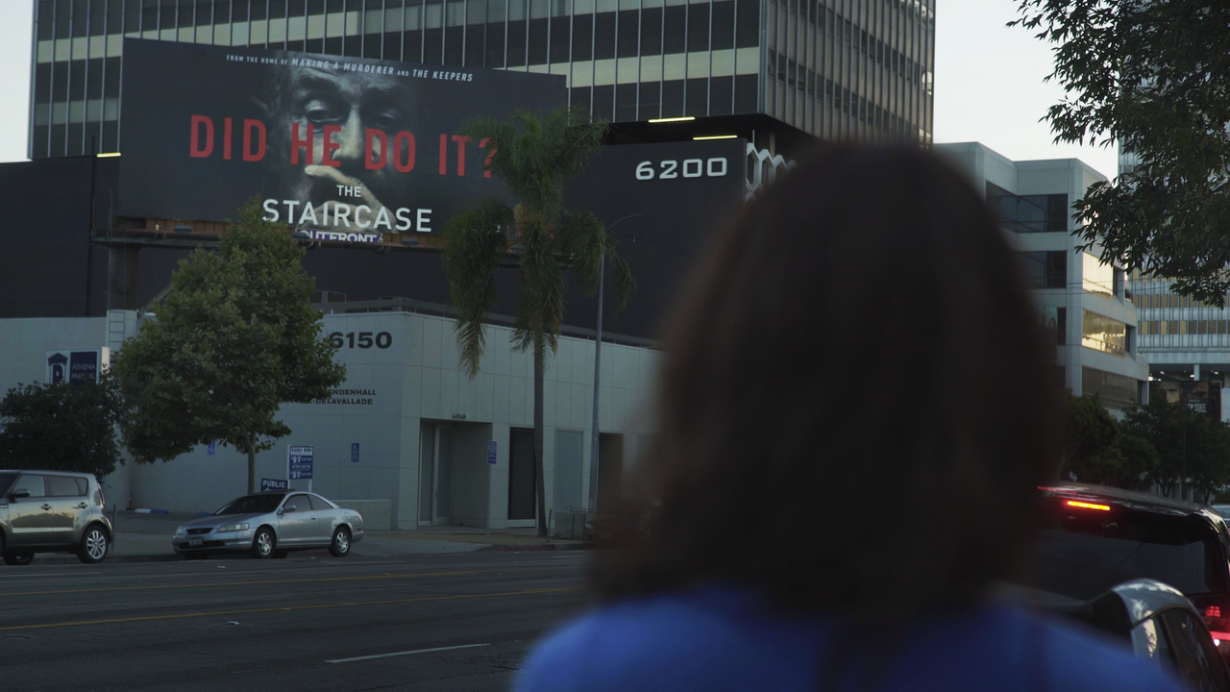
The use of a metanarrative – a film about the making of the film – seems set up to serve two ends: of understanding their lives and the limits of agency through self-reflexive storytelling; and of sensitively broaching traumatic themes. The meta-documentary Subject (2022) – which examines the impact that such documentaries and their commercial success have had on the lives of their human subjects – has highlighted the filmmakers’ duty of care and demonstrated how truth-telling and filmmaking, even when anchored in social activism, can become exploitative. Unlike Ari Folman’s Waltz with Bashir (2008), for example, which stylistically uses animated images to supplement interviews in his recollection of traumatic events linked with the 1982 Israeli invasion of Lebanon, Four Daughters relies on the filmmaker as an external mediator to other people’s memories and narration. As such, some of Ben Hania’s directorial choices and their narrative effect are perplexing. Several scenes demonstrate that the creative device can easily slip from one of empathy to a more insidious voyeurism.
One of them touches upon implied rape. “There’s something bothering me”, says Majd Mastoura, playing Olfa’s incestuous partner Wissem. “It’s not something for the cameras”, he continues as the girls reenact a scene in which they confront his character’s history of sexual abuse. Lines have seemingly been crossed; the actor is deeply uncomfortable. He asks to speak privately to Ben Hania, whom we hear but don’t see. As they step out, the daughter Eya justifies the scene: “I’ve already replayed this scene with a shrink”, she says, toying with a butcher’s knife in her hands. Behind her, the camera hones in on Tayssir’s flowing tears as she struggles to relive those painful moments. Does everything need to be shown? Who should decide on the worthiness of their memories as public material, as part of this spectacle, as opposed to those that could remain private? It will not be reshot but the scene is kept anyway. “I have to protect myself”, Hend Sabry tells Olfa early into the film. But the question of who protects Eya and Tayssir (still a teen) as they relive their trauma for Ben Hania’s frame is elusive. The human cost of extracting these stories, treated at best as mere material, sometimes feels less significant than the message it’s supposed to deliver.
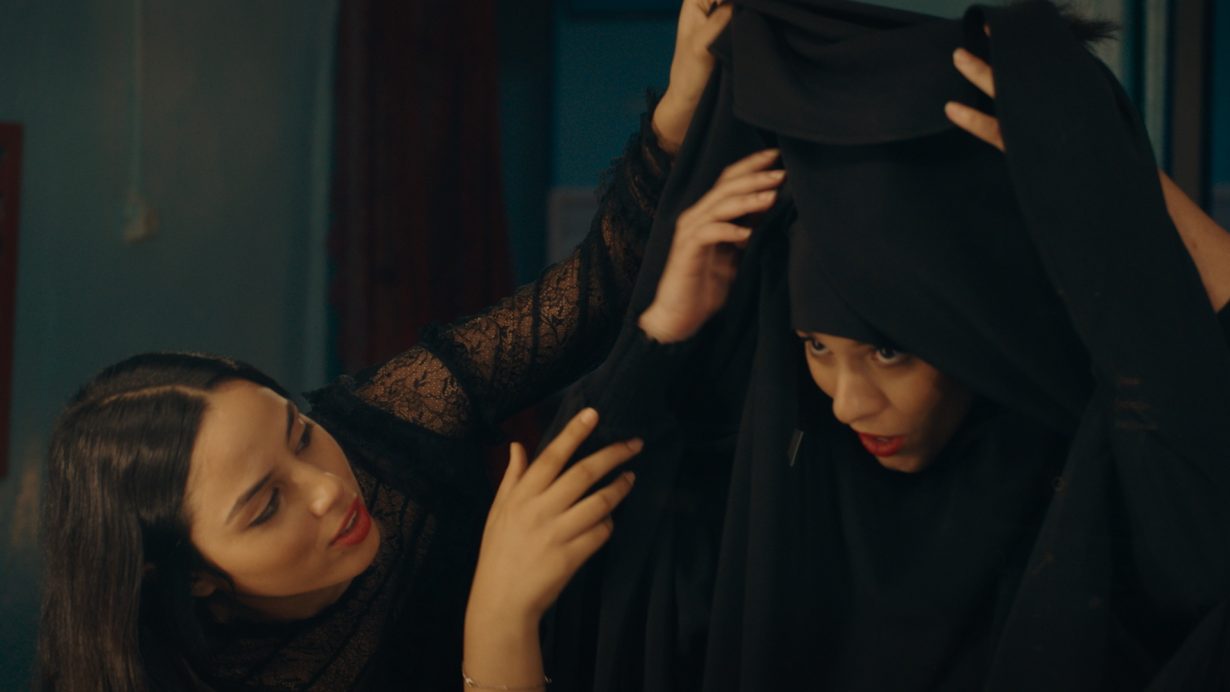
Another scene similarly relates to informed consent in the use of Rahma and Ghofrane’s images, whom we later see in the film when arrested during a counter-terrorism operation in Libya. Four Daughters includes television broadcast footage of Ghofrane reuniting with her infant daughter in detention. In that clip, a supplicant Ghofrane, subjugated to being filmed, begs to see her child, directing her pleading gaze to the man behind the camera. The inclusion of this intimate footage has unabashed political objectives, as historically Tunisian authorities have been reluctant to accept the return of former ISIS affiliates and their children. The remaining daughters’ own stories have fed the news cycle, as Olfa previously testified for their return on TV channels. The Tunisian public broadly knows about the girls’ fate and the family’s demand for their return, which also concerns dozens of other cases. As their story shifts from news content to documentary film, it raises even more questions about editing, performance, audience and responsibility.
The longer we search for Ghofrane and Rahma, whose testimonies and points of view are seemingly extraneous (as are those of other family members and friends), the harder it is for Four Daughters to avoid replicating the trappings of a voyeuristic directorial eye. Ultimately, the family’s pain is exhibited as little more than a cautionary tale on women’s suffering and how fanatics exploit existing vulnerabilities. Ben Hania explains in the film’s introduction that the two eldest have been, obliquely, “devoured by the wolf”, a danger not quite fully vanquished that maybe requires the filmmaker to take more sinuous roads to confront it. Yet Ghofrane and Rahma are very much alive and could speak for themselves. Maybe they will one day.
